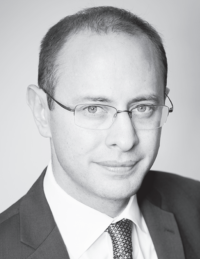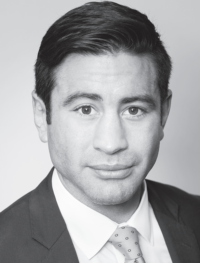By Joshua Burd
Kellen and Chris Murphy are no strangers to the world of real estate and public policy in New Jersey, but in recent months they’ve been seeing it from an entirely new vantage point.
Early this year, the brothers launched Murphy Partners LLP, a boutique law firm focused on land use, governmental affairs and economic incentives advisory. It’s a far cry from the organizations that helped shape the early parts of their careers — for Kellen, the powerhouse firm Riker Danzig Scherer Hyland & Perretti LLP, and for Chris, the office of Lt. Gov. Kim Guadagno — yet they are excited at the chance to build their own practice from the ground up.

“I made a decision that I wanted to do something different and Chris was getting ready to leave the administration, so the timing worked out well and we planned and prepared,” said the 34-year-old Kellen Murphy, who serves as the firm’s managing partner. “And it’s been fun, but there’s no doubt that it’s a lot different from working in a great firm like Riker, which I couldn’t speak more highly of, and the people there are amazing and wonderful.
“We left because this is something unique that we wanted to do.”
The brothers have set up shop in downtown Newark, which they said was a natural choice based on the scope of their practice. And they have done so at a time when construction is booming in the city and elsewhere in the state, much of it fueled by economic incentive programs.
How those programs will look next year could depend on the winner of the upcoming gubernatorial election between Guadagno, a Republican, and Democratic nominee Phil Murphy (no relation).

“Things do change over time. It’s not like things should and always will stay the same,” said Chris Murphy, 33, who leads the firm’s governmental affairs and economic advisory practices. “I think that it would be nice to see them stay in place and sunset naturally under the legislation, but if there are some changes, businesses, developers and other people adapt.”
About 30 percent of the firm’s business comes from incentives advisory work, meaning they aren’t overly concerned about any potential changes to the programs.
“It’s a great value-add, but the bulk of what we’re doing is on the transactional and the development and land use side,” Kellen Murphy said. “So as far as our practice goes, I think we’ll adapt to any change that there is in the legislation.”
To discuss the founding of their firm and the state of development in New Jersey, Real Estate NJ sat down recently with Kellen and Chris Murphy. Below are excerpts from the interview.
Real Estate NJ: This is still very new for you both and seems like a big change from what you had been doing for several years. Was it nerve-wracking to go out on your own?
Kellen Murphy: (My wife and I) had our baby in January and we launched our firm in January, so it was definitely nerve-wracking, but my wife was supportive. And it’s something that in the back of my mind I’ve always wanted to do and Chris probably always wanted to do at some point. We’ve enjoyed working together in other ventures throughout our lives, (such as) playing hockey, which we both played competitively. … So it just naturally came together.
Chris Murphy: For me, I was a political appointee, so my time was running out. Naturally, it was time for me to evolve in the private sector and the question was: Do I want to go to another firm or do I want to do my own thing? And I felt like we had a real opportunity here to start something exciting and fresh — and after talking to people, and as we’ve seen since we’ve launched, bigger clients are more than willing to team up with a young boutique law firm that is offering good service. My pitch is always: ‘When you sit down with us, you’re meeting with the principals and we’re the ones who are going to be working on this.’ So if I get a call at 8 in the morning on a Saturday, I pick it up. … I had one client who called me every time he walked his dog at 9:30 at night for two months and it was great — I loved it and we got things done.
So it was nerve-wracking, but we took a chance. And this thing is very fresh and very new, but so far we’ve been very fortunate.
RENJ: It’s pretty clear that you both know your way around Trenton. Why not set up your office there instead of Newark?
CM: We’ve really felt that for a couple reasons we’d be based here: We truly believe in Newark and believe the city is on the rise. The city really has a lot of potential. I personally live in the Ironbound, so not only is my office here, but I actually live here.
We feel there’s a lot of opportunity, but also being based in Newark gives us the ability to market ourselves as a statewide firm. We’re not the attorneys from ‘X’ town who only do work in that town. One of the projects we’re working on now is in Camden and it’s a great potential redevelopment project. We’re working on projects in Newark and we’re working on projects everywhere else. It’s been really exciting. The majority of our work is transactional real estate work — and land use and redevelopment — and incentives are also like the cherry on top. Everybody wants to talk about incentives. They don’t necessarily apply to every project, but I think if they’re not part of the discussion, developers or businesses are really missing out.
RENJ: Even if it’s not the majority of your business, I would imagine it has to come up often.
CM: Every potential tenant, on the list of 10 things they ask about, incentives are always on the list. They always want to know about incentives because when you’re competing for marquee corporate tenants that have an option to be in New York City or Newark or Jersey City, incentives really close the deal in most cases. And that’s what they’re supposed to do — it’s supposed to incentivize you to make that move, and in a lot of these cases it’s doing that.
KM: With New York extending their incentive programs and all of the surrounding states pretty much having some type of incentive programs, they’ve achieved bipartisan support in all of these states. And they’ve had bipartisan support in New Jersey, so I imagine in some form they will be around.
CM: It is a financial decision. Companies are looking at their bottom line, and if (they) can be more profitable or save money — or this deal makes more sense because of incentives in New York or because of incentives in Philadelphia as opposed to Camden — they’re going to do it.
RENJ: You mentioned that Jersey City and Camden have really benefited1 from the state’s incentive programs. What do you think are the next areas to do so?
CM: A lot of great things have happened under (Newark) Mayor Ras Baraka. I’d really like to see Newark take even more advantage of the Grow New Jersey legislation, because it’s an urban transit hub under the legislation, so it’s a highly incentivized area. We’re seeing a ton of great projects coming online now and … companies are going to be able to look at incentives. Hopefully they’re going to use those incentives to help fill that space with marquee tenants.
RENJ: Anywhere else?
CM: As incentives evolve, I think they’re going to look at: ‘HoW do we focus on some of these suburban areas that have these major corporate office parks and repurposing those?’ This legislation, the Economic Opportunity Act, is very much geared toward urban areas and, under the current incentives, it’s hard for someone looking to fill Class A office space in Morris County to compete incentive-wise with somebody looking to fill office space in Jersey City. And there has to be something else they can offer, which they do — they offer a lifestyle. … But based purely on incentives, if I’m a corporate tenant and I’m saying the only thing that matters here are incentives, the urban areas are where you’re going to go. … That should evolve and maybe the next round of legislation is different.
RENJ: Let’s shift away from incentives and talk about land use, since that is a major part of your practice. Have you seen more towns become open-minded on the land use side?
KM: I’ll use my hometown as an example. I live in Red Bank. There’s been five proposals submitted for a very large development that’s relatively controversial in town, but it’s going to be potentially a very large-scale development, something that Red Bank really hasn’t seen before at that level. But the fact that they passed this redevelopment plan and requested these bids, I think, is a sign that even a town like Red Bank is becoming more open to the use of redevelopment zones and redevelopment plans to further economic growth.
RENJ: Aside from the incentives, are there any other laws or potential public policy changes that could impact your practice?
KM: The biggest land use change that we’ll see that I think will impact our practice is what happens with the Ironbound’s rezoning, because I think that will encourage a lot of development in the Ironbound, particularly around the train station.
Life lessons
Chris Murphy has managed to build a career in law, but not without literally taking a few lumps along the way.
Prior to becoming an attorney, the younger Murphy brother competed professionally in both hockey and boxing. Needless to say, his mother was relieved when he ultimately chose a noncontact career.
But he says it was his parents who encouraged him and Kellen Murphy to make the most out of their involvement in athletics and to adopt the philosophy of “if you’re going to do something, try to be the best at it.”
“We’re not 50 percent kind of guys,” Chris Murphy said. “We’re 150 percent or zero … and that was really driven into us through our sports as young guys and I think it’s really shaped who we are as people.”









